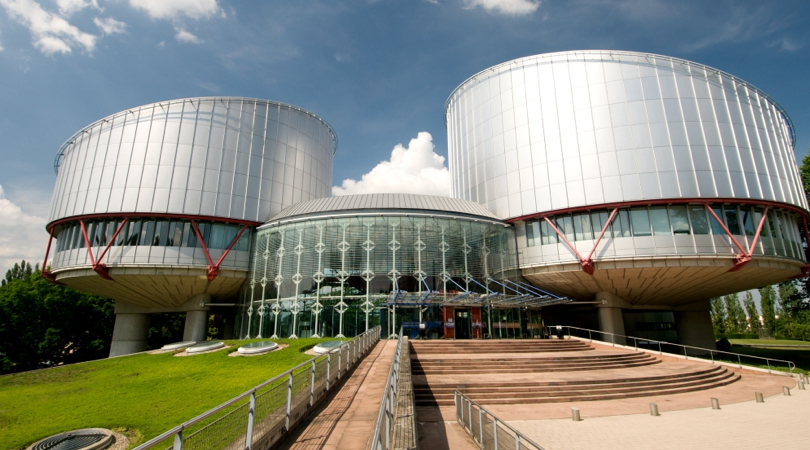
[vc_row type=”in_container” full_screen_row_position=”middle” scene_position=”center” text_color=”dark” text_align=”left” overlay_strength=”0.3″ shape_divider_position=”bottom” bg_image_animation=”none”][vc_column column_padding=”no-extra-padding” column_padding_position=”all” background_color_opacity=”1″ background_hover_color_opacity=”1″ column_link_target=”_self” column_shadow=”none” column_border_radius=”none” width=”1/1″ tablet_width_inherit=”default” tablet_text_alignment=”default” phone_text_alignment=”default” column_border_width=”none” column_border_style=”solid” bg_image_animation=”none”][vc_column_text]
The Strasbourg Court upholds Swedish legislation on secret surveillance – but considers that the protection of individuals’ privacy rights can be improved. Photo: Council of Europe
[/vc_column_text][/vc_column][/vc_row][vc_row type=”in_container” full_screen_row_position=”middle” scene_position=”center” text_color=”dark” text_align=”left” overlay_strength=”0.3″ shape_divider_position=”bottom” bg_image_animation=”none”][vc_column column_padding=”no-extra-padding” column_padding_position=”all” background_color_opacity=”1″ background_hover_color_opacity=”1″ column_link_target=”_self” column_shadow=”none” column_border_radius=”none” width=”1/1″ tablet_width_inherit=”default” tablet_text_alignment=”default” phone_text_alignment=”default” column_border_width=”none” column_border_style=”solid” bg_image_animation=”none”][vc_column_text]In July 2008, the Centre for Justice (Centrum för rättvisa), a Swedish public interest law firm, challenged the Swedish act on signals intelligence surveillance (the FRA Act) before the European Court of Human Rights in Strasbourg. The Centre asked the Court to assess whether the FRA Act provided adequate safeguards to meet the minimum standards under the European Convention on Human Rights. Due to the complaint, the Swedish Parliament introduced an amended version of the FRA Act in 2009, in order to better safeguard the individual’s right to privacy. Today, the Strasbourg Court upheld the amended version of the FRA Act while voicing some criticism and maintaining that there is still scope for improvements.
– We are pleased to finally have received the judgment from the European Court of Human Rights in this case. Signals intelligence form an important part of Sweden’s defence intelligence operations, but it also permits large-scale secret surveillance of private communications. For this reason, there was a significant public interest in getting clarity on whether the FRA Act provided adequate safeguards for the protection of individual rights and freedoms, says Fredrik Bergman, head of the Centre for Justice.
The Strasbourg Court holds in its judgment that the signals intelligence conducted by the FRA (the Swedish Defence Radio Establishment) interferes with the individual’s right to privacy under Article 8 of the European Convention, but considers that the interference can be justified with respect to the state’s interest in conducting defence intelligence operations for national security reasons. The Court’s overall assessment is that the amended FRA Act provides such adequate and sufficient guarantees against arbitrariness and risk of abuse in order to allow for the conclusion that Sweden complies with the minimum requirements under the European Convention on Human Rights. Nevertheless, the Court found certain shortcomings in the system, and notes that there is scope for improvement with regard to the protection of the individual’s right to privacy.
The Strasbourg Court levels criticism against the FRA Act in two main respects. First, the Court holds that the regulation of the communication of personal data to other States and international organisations is not sufficiently clear. Second, the Court considers it a flaw that the state supervisory body, the Foreign Intelligence Inspectorate, SIUN, is not required to provide reasons for its decisions when reviewing complaints from individuals who suspect that they have been subject to surveillance. This means that, in practice, it is impossible for individuals to ascertain whether their communications have been intercepted by the FRA.
– The judgment from the European Court of Human Rights clarifies that the FRA Act complies with the minimum safeguards of the European Convention, but it also indicates that the regulatory framework can be improved to provide better protection of the right to privacy. It must be assumed that the Swedish Government will now take the Court’s observations on board, says Fredrik Bergman.
Background
The Swedish Defence Radio Establishment, the FRA, has been conducting signals intelligence surveillance in radio waves for a long time as part of Sweden’s defence intelligence operations. To keep pace with technological developments, the signals intelligence regime was extended in 2008 to also cover surveillance in cables, i.e.internet and mobile communication – which was not allowed under the previous legislation. During the summer of 2008, this new legislation caused an intense public debate in Sweden on state surveillance and privacy rights.
Shortly after the Swedish Parliament passed the FRA Act on the 18thof June 2008, the Strasbourg Court found a violation of the right to privacy in a case against the United Kingdom, which had similar legislation. In its judgment, the Court set out a number of criteria for when signals surveillance could be allowed and justified under the European Convention. The FRA Act clearly failed to meet several of these criteria and it became evident that the requirements of the European Convention had not been properly accounted for when the act was considered. The Centre for Justice thus decided to challenge the Swedish signals intelligence regime before the Strasbourg Court to get an assessment of whether the Swedish legislation provided sufficient safeguards for the protection of individual rights.
The Swedish Government also acknowledged the problems with the first version of the FRA Act and, relatively quickly, amended the act in order to strengthen the protection of fundamental rights. Still, even with the amendments, a number of questions with regard to the legislation’s compliance with the European Convention remained.
The Strasbourg Court, which only examines a fraction of all complaints, considered that there were sufficient grounds for an examination of the complaint even after the amendments and communicated the case with the Swedish Government. While the cases was pending the Court asked the Government to clarify how individual privacy rights were safeguarded in the context of signals intelligence surveillance and if all of the requirements of the European Convection had been met.
Today’s judgment will become final within three months unless one of the parties request that the case be referred to the Grand Chamber.
_____________________________________
For questions on the case, please contact Fredrik Bergman, head of the Centre for Justice ([email protected]). [/vc_column_text][/vc_column][/vc_row]